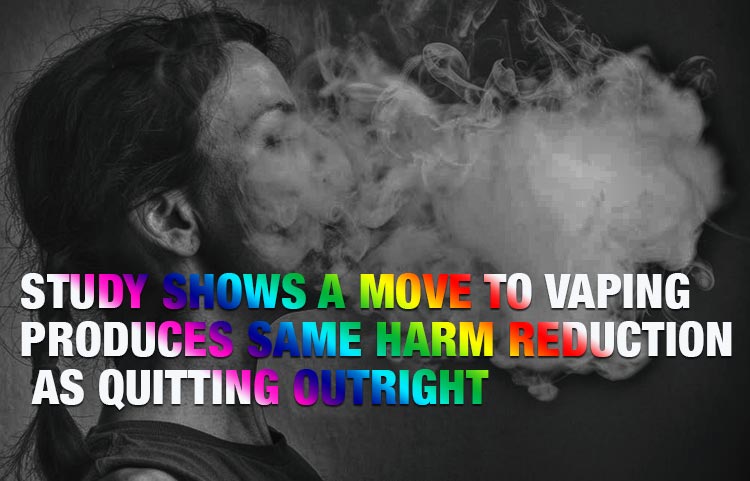Study Shows a Move to Vaping Produces Same Harm Reduction as Quitting Outright – It’s been a good month in the vaping press! And even though we’ve covered them a lot lately, our hats are tipped to JUUL Labs Inc. for sponsoring this potentially game-changing study, which showed that vaping presents little to no harm, when compared to smoking.

In the randomized study, 90 current smokers were tasked with one of three options: vaping instead of smoking, stop smoking, or continue smoking. After just five days, urine and blood levels monitoring eight biomarkers of exposure were reduced by 85% in the vaping group – nearly identical to 85.3% for those quitting outright over that period. The smoking group showed the same markers were 14.4% higher than the baseline results, established after 12 hours of non-smoking and non-vaping from the beginning of the study.
“The equivalent reductions in these specific cigarette-related biomarkers across the groups who abstained from smoking and those who used JUUL products reaffirms the role vapor products can have for the adult smoker,” Juul Labs CEO Kevin Burns said via press release. “Although addictive, nicotine is not directly responsible for the cancers that are commonly associated with cigarette use; rather it is the harmful constituents that are present in combustible smoke.
He continued, “The more that can be done to eliminate cigarettes, the greater the impact will be on the public health. We are committed to conducting rigorous, scientific research as we contribute to the ongoing dialogue regarding vapor products, and look forward to sharing additional research with the medical, scientific, and public health communities.”
These findings come at an opportune time, since the U.S. Food and Drug Administration (FDA) has pressured JUUL – the world’s largest vaping manufacturer – to produce evidence that vaping is not nearly the public health threat some authorities claim. These are the same authorities responsible for countless bans and restrictions being unfairly placed on vapers and vape companies.
One example? This video, which is designed to deter youth from vaping, but goes above and beyond with erroneous claims (and even outright lies) about the practice, and the potential effects of vaping. It’s hot-headed, fact-light “journalism” like this that only works against our industry.
That said, we should also be conscious of the study itself. While we remain staunch supporters of JUUL’s mission against misinformation about vaping, because this is a JUUL-sponsored study, we need to take the findings with a grain of salt until they can be further substantiated from independent research. Of course, we’ll keep an ear to the ground to see if and when these studies arise.




